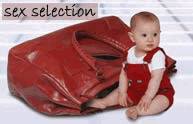A Child Against All Odds
This excellent series, broadcast in 2006, consisted of six programs, each of which followed 3 or 4 different cases with a similar theme. To see how the public responded to the issues raised, click here. You can watch 4 short video clips from the series on the BBC website. They include:
PGD - Pre-Implantation Genetic Diagnosis
Angela Donovan was born with a rare form of eye cancer, losing an eye at two weeks old. Her son spent his first two years in hospital. She has applied to the HFEA for the right to screen for the condition for their next child. Couples are allowed to screen for inherited genetic disorders, but in this case the cancer is 'treatable', so the Donovans have to apply for permission directly to the HFEA.
The concern here is that the Donovans will be identifying embryos with the cancer and destroying them. PGD is not a form of treatment, it enables couples to avoid having children with certain disorders.
The Jacksons are expecting triplets after IVF. Doctors are now advised to attempt to implant a maximum of two embryos in IVF due to the increased risk that having triplets involves. In this case, one of the two embryos implanted split to form twins.
The BBC drama of 2006, Family Man, had a story-line about multiple births. Patrick Stowe takes the controversial decision to implant 3 embryos as this increases the chance of a successful pregnancy. Sadly, all three embryos take, and three babies are born prematurely with significant disabilities, leading to the breakdown of the marriage of the couple.
The Perrys have strong religious beliefs that embryos should not be frozen or discarded. All embryos, they believe, should be implanted. Helen produced a number of eggs but wasn't able to continue with treatment, so the eggs were frozen for use in the future.
Emily Perry was the first child in the UK to be born from frozen eggs.


